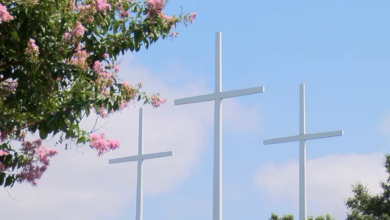Muslim pilgrims stone the Devil, sacrifice animals on day 3 of Hajj

Riyadh, Jul 9 (EFE).- Muslim worshippers making the annual pilgrimage to Mecca on Saturday performed the rituals of stoning the devil and sacrificing lambs, among other animals, on the third day of the Hajj, which coincides with Eid al-Adha, or the Feast of the Sacrifice, Islam’s main festival.
Nearly one million pilgrims, including international travelers taking part in the event for the first time in two years because of the pandemic, began to move before dawn to the Mina Valley to attend the Eid prayer.
“After the exceptional health conditions that shook the entire world, we thank God for facilitating the return of pilgrims. Thanks to Him, glory to Him and the enormous effort of workers from all sectors,” Saudi Arabia’s king, Salman bin Abdelaziz, said in a televised speech.
Once the prayer is over, each pilgrim sacrifices an animal – usually a lamb, but it can also be a cow or a camel depending on their financial resources – before shaving their heads, in accordance with the rituals performed by the prophet Mohammed 1,400 years ago.
According to Islam teachings, the pilgrims who do not have enough means must fast for three days during the pilgrimage and seven after returning to their country.
Since 1983, Saudi authorities have been in charge of the animal slaughter and meat distribution on behalf of the pilgrims, who only pay the price of the lamb to the Islamic Development Bank.
After fulfilling these duties in Mina, the devotees climbed the so-called Yamarat Bridge (Bridge of Stones), to stone the devil, an act in which each pilgrim throws 21 pebbles they collected the previous day against a wall symbolizing Satan.
All the rituals are performed in Mecca, although pilgrims visit the Prophet’s Mosque in the city of Medina, some 400 kilometers north of the holy city, before or after the event.
Hajj, one of the five pillars of Islam, is mandatory for every Muslim whose health and financial resources allow it, but it is also one of the important sources of income that Saudi Arabia was forced to give up in the last two years because of Covid-19. EFE
sa-fa-cgs/ta/ks





